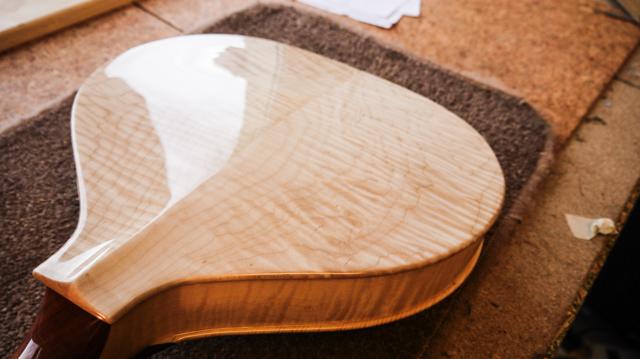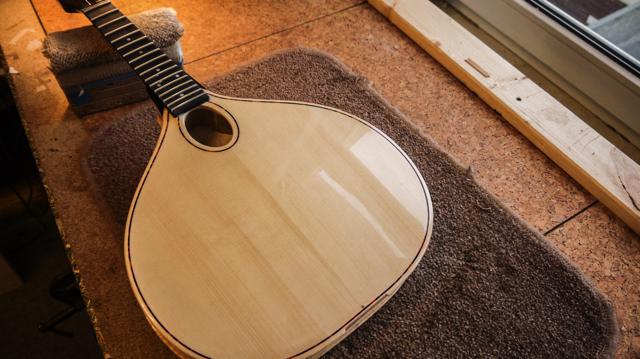New Celtic mandolin!

Celtic mandolin before stringing up
F holes in a Celtic mandolin? Are you sure? Why would you want a Celtic f mandolin? Well, some time ago I wrote a blog piece called “What is a Celtic mandolin” where I asked a few top players what they thought a “Celtic mandolin” was. I also included my own highly biased views about what I feel works and what does not about many of the mandolins out there destined for the “Celtic” market. Discussions about the post were interesting and I got a few good ideas from what folks had to say. Because of this discussion I got thinking about Celtic mandolin design beyond just making what’s been done before.
So, I set about making a pair of mandolins that I hoped would not only have the tonal qualities folk like in “onion” shaped mandolins but could hopefully project a little more like their “shallot” shaped cousins from across the pond. The first pair I made were interesting – I strung up the first one and it was so successful, I didn’t bother stringing up the second. It went in the bin.

remember this from last year?
Birth of a Celtic f mandolin
So it was back to the drawing board. It’s tricky, trying to make a large bodied mandolin project. It’s easy to make a loud coarse sounding one, but I’m interested in quality as well as quantity. Likewise I knew the direction to go in wasn’t to knock out another flat back Sobell “tribute” – we made a lot of mandolins over the years and in general much preferred the maple bodied ones over the rosewood ones. With maple there was a hint of “chop” in the bass you’d normally associate with the better American instruments yet with that European sparkle in the treble. I thought I’d srart with a pair – a Celtic oval hole and a Celtic F mandolin. And I’m very happy with the results.

Celtic f mandolin maple back and sides
So this new Celtic F mandolin is designed for a bit more of that “chop” in the bottom end. It’s due to go to a chap in Scotland soon but a feller called round on his way to a mandolin camp in Dresden last week and he really liked it. The instrument responds super fast, much more so than you would expect for such a wide mandolin.

As for the oval hole Celtic mandolin, whilst the body shape is the same as the Celtic F the sound is sweeter and more familiar to those who like traditional Sobell maple style mandolins. Less bark perhaps, but more warmth.

rear head veneer – Indian rosewood and 1907 Cuban mahogany neck

Celtic oval hole mandolin
The first pair (one oval and one f) have been strung up for a while now and I’m very happy with them – and soon it’s time for then to go out to their new homes – so their isn’t time to send them off to make a video. But hopefully I’ll have time when I finish off the rest from this batch which are due back from the sprayers soon.